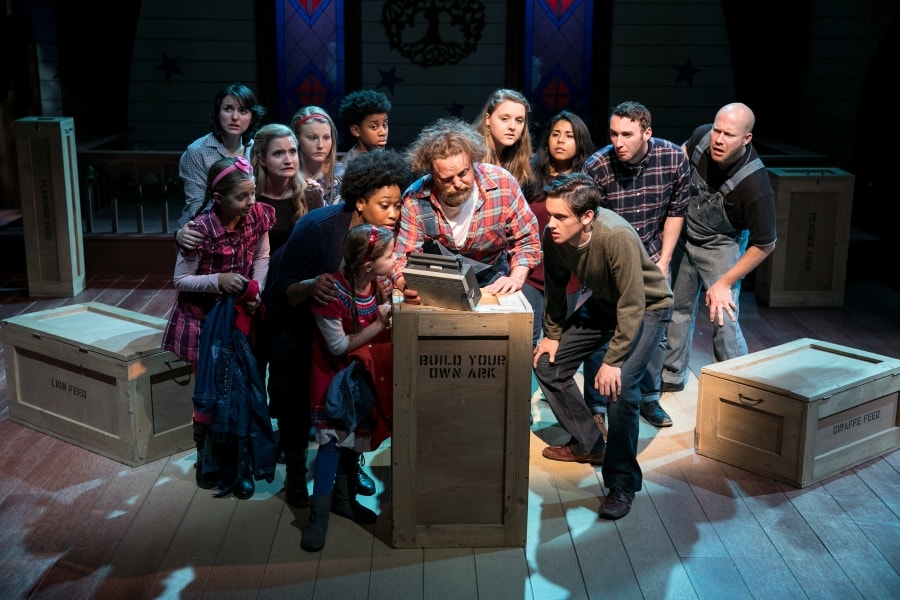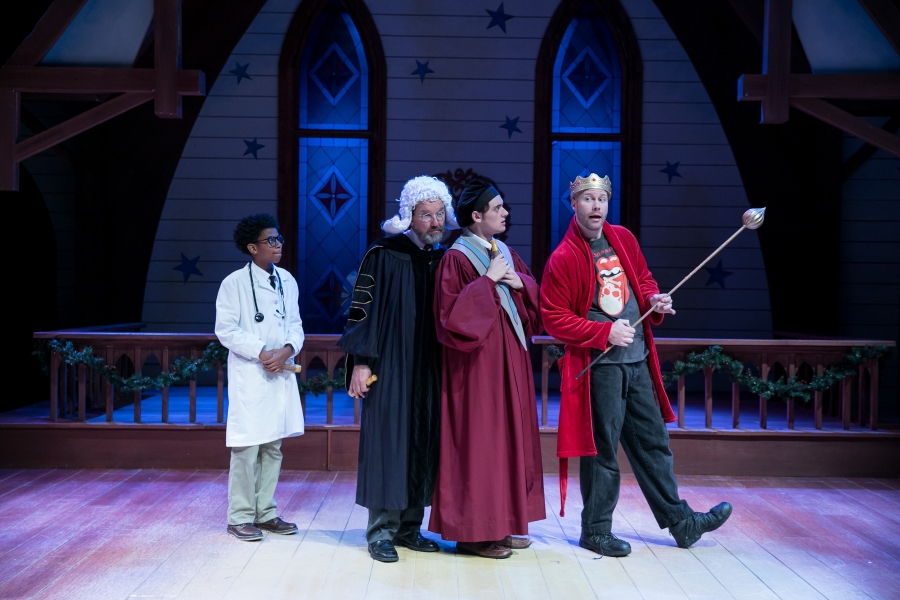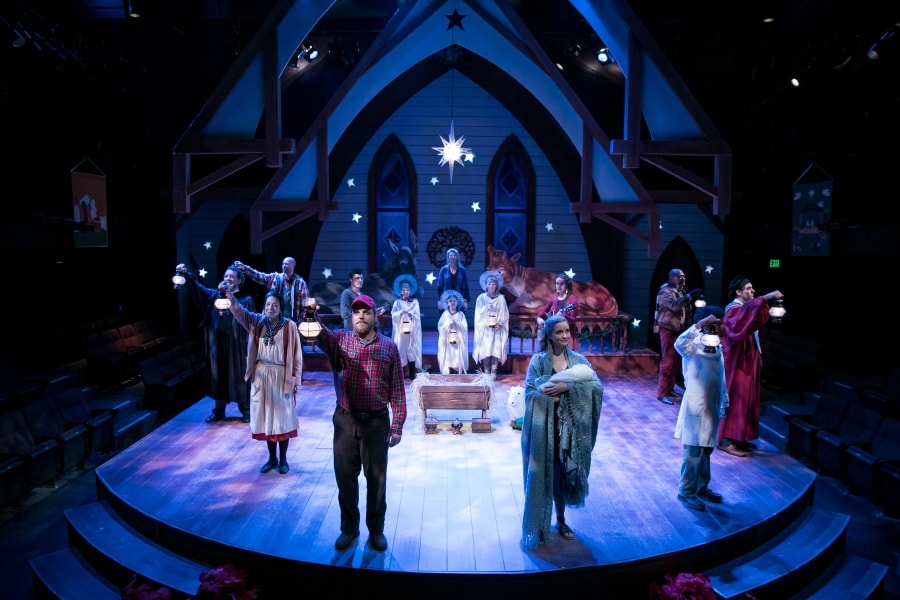As audiences across the country gear up to enjoy classic holiday stage productions, theatregoers in the Appalachian region are flocking to Triad Stage of Greensboro, N.C., to see Beautiful Star: An Appalachian Nativity (Nov. 25-Dec. 24), a production that has become a tradition to the community in the Blue Ridge mountains.
The mission of Triad Stage is to develop and present work that reflects the rich history of the region, and although the company is also mounting a production of A Christmas Carol this season, the theatre’s staging of Beautiful Star brings the spirit of Christmas to the company’s backyard. The play with music has been remounted six times since its premiere in 2006 and transplants the medieval York Mystery Cycle to the Blue Ridge peaks for a down-home retelling, chronicling stories from the Bible from creation to the birth of Christ.
The genesis of the play’s development began when Triad Stage’s founding artistic director, Preston Lane, was perusing the library at the Yale School of Drama as a graduate student. While searching for a Pinter play, he came across Tony Harrison’s The Mysteries, an adaptation of the York Mystery Cycle, misfiled among the shelves.
Medieval mystery plays were short liturgical dramas that depicted scenes of the Bible, often performed in Latin. The plays would be put on by churches and by guilds within their communities. “[They were] plays created by people in their community that take a story that happened somewhere else and make it relevant to that community,” says Lane.
After training to be an actor—during which time his Appalachian twang was transformed into a Transatlantic accent—Lane decided to bring this idea of re-envisioning classic stories through the lens of his own community down south.
“The York Mystery Cycle was one of the first things that made me begin to think about drawing on my Appalachian culture to create theatre,” explains Lane. “We can make fun of the people of the Appalachian mountains; you can look down on them, it’s viewed as sort of backwards. It was hard for me as a young actor and director to say, ‘Well, here is part of who I am and I want to bring it to my work.’”
Lane traveled to York, England through a TCG Fox Fellowship Foundation grant to research and develop his adaptation of the York Mystery Cycle, a set of mystery plays that were performed in York traditionally on the feast day of Corpus Christi. Nearly a decade later, after founding Triad Stage, Lane partnered with singer songwriter Laurelyn Dossett, who writes songs about the region, to bring storytelling and narrative elements through music to the stage—a perfect vehicle to fully realize his Appalachian-centric project.
“We’ve been working together for 11 years now and someone recently joked that we are the Rodgers and Hammerstein of Blue Ridge,” says Lane about his partnership with Dossett.
During a successful, sold-out run of their first show together, Brother Wolf—an Appalachian version of Beowulf—Lane announced that the duo’s next project would be a retelling of the York Mystery Cycle, without fully touching base with Dossett first.
“Laurelyn and I had talked about working on a new play, and the idea had been out there,” Lane said. “Maybe I didn’t have full confirmation that she was going to do it, but I just went ahead and said she was going to do it.”
“I thought that was just talk at the bar!” says Dossett, who gladly took on the task of bringing Appalachian old time music—a genre that predates bluegrass—to the 14th-century York Mystery Cycle.

The first act of Beautiful Star covers the stories of creation and the story of Noah and the flood, and the second act begins with the angel arriving to Mary and concludes with the nativity story.
“It is a play within a play, and the conceit is that there is a small mountain church in North Carolina called Open Heart Community Fellowship and they are putting on their version of the nativity story,” says Dossett.
The story follows members of the fictional congregation as they put together their retelling of The Mysteries, and the audience members of Beautiful Star serve as the churchgoers.
The music, a combination of traditional church songs and original songs by Dossett, represents the Appalachian culture and showcases the regional vernacular. Dossett describes the alliteration and heightened language within the songs as “Shakespearean.”
“The music functions as a Greek chorus,” says Lane. “The musicians in this play come in and comment on what we’ve just seen, or introduce what we’re about to see, and then there are times the entire congregation breaks into song.”
Although the play premiered a decade ago, this is the first time Dossett will sing her songs and play in the show. She joins two other musicians who switch off instruments throughout the play—including a fiddle, banjo, mandolin, guitar, and upright bass, which are played in traditional Appalachian old time music.

One of the framing devices for the meta-theatrical piece is within the story of Abraham and Isaac, who are portrayed by a father and son in the congregation, and the son is in remission from cancer.
But overall, the play takes on a playful tone and highlights the surprising elements of comedy hidden within the York Mystery Cycle.
“Humor was a real part of the cycles,” says Lane. “There’s a lot of ‘Hee Haw’ meets York Mystery Cycle in the play.”
The play includes a comic bit from “The Second Shepherd’s Play,” a play within the York Mystery Cycle, in which shepherds plan a heist to steal sheep. Other fun elements come through in the portrayal of Noah, whose character is an old, lazy, mountaineer. The daunting serpent in the Garden of Eden is presented as a fuzzy sock puppet.

The play has attracted audiences from all over the Appalachian region, and after years of pleas form audience members for the return of Beautiful Star, Lane decided to revisit the play. “It was time to bring it back and to breathe fresh air into it—it is just a joy to watch audiences respond,” he says.
“I don’t think Laurelyn and I knew that this play was going to become as important part of the community as it has,” says Lane. “We were shocked when it broke all the box office records and everyone was talking about it in the first year. The community responded so strongly to the sense of wonder that the play ultimately leads to.”


